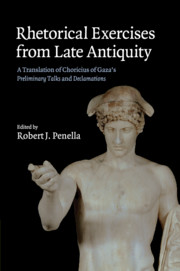 Rhetorical Exercises from Late Antiquity
Rhetorical Exercises from Late Antiquity Introduction
Published online by Cambridge University Press: 29 January 2010
Summary
The twelve declamations presented in this volume are examples of a standard kind of ancient rhetorical exercise. If we were to refrain from taking account of anything beyond their contents, we might plausibly imagine them to have been composed in any century of the Roman Empire from the time of Augustus on. The same could be said, for the most part, about the preliminary talks. But we know that these pieces are the work of the sophist Choricius, composed in sixth-century AD Gaza, and it is with Choricius that we begin.
choricius and the school of gaza
Choricius was a member of the School of Gaza, which had its roots in the reign of the emperor Zeno (474–91) and extended into the reign of Justinian (527–65). The height of Choricius' career fell roughly in the second quarter of the sixth century. The traditional terms “School” and “members” should not be taken to imply any formal cohesion, though there were features of the School that its members had in common; Nigel Wilson's “circle” or “group” would probably be better expressions to use. The School was a marked flowering of rhetorical, literary, and intellectual Greek culture, “[l'] ultimo bagliore dell' ellenismo nella regione siro-palestinese prima della conquista musulmana” – “the last gleam of Hellenism” in the region, in Federica Ciccolella's words, before the Muslim conquest.
- Type
- Chapter
- Information
- Rhetorical Exercises from Late AntiquityA Translation of Choricius of Gaza's Preliminary Talks and Declamations, pp. 1 - 32Publisher: Cambridge University PressPrint publication year: 2009
